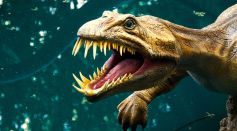ENVIRONMENT & CLIMATE
Mechanical Whisker Simulation Could Help Better Understand Human Touch
Honey Healing Properties: Anti-Inflammatory Nanoparticles May Be Added in Ointments
SCoPEx Balloon Test Flight Aimed at Cooling Earth Canceled, Likely to Launch on 2022
Reindeer Cyclone Explained: Drone Captures Moment Deers Defending Fawns

Trapped in Time: The Ice Age Never Officially Ended in a Part of the Black Sea

Forest Destruction Skyrocketing in 2020, Environmental Experts Warn of Devastating Future

Humans Cause Climate Change: NASA Show Direct Evidence from Calculation
Early Humans Collected Unusual Objects Shedding Light on Cultural Evolution, Origin of Homo Sapiens

Rabbits Dig Up Two 9,000-Year-Old Artifacts from Bronze Age; Guess Where They Found It
Female Putty-Nosed Monkeys Recruit Males to Defend Against Predators

Northern Lights Sounds Explained: Scientists Find Answer in 24-Hour Recording

New Meat-Eating Predator Discovered Named The 'One Who Causes Fear'
Hotter Mantle Caused Enormous “Water World” in Ancient Earth

Polyimides: Organic Material Could Usher New Generation of HVAC Devices
Most Popular

NASA Reveals an Astronaut Was Medically Evacuated From the ISS for the First Time After a Non-Emergency Health Scare

Sun Reaches Solar Maximum: What the Intensifying 11-Year Solar Cycle Means for Earth

How the Immune System Fights Diseases: Antibodies, Vaccines & Lasting Protection

Ancient Interbreeding Between Neanderthals and Modern Humans Revealed




